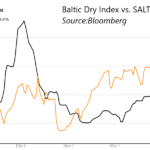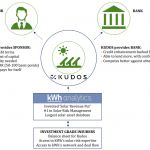What I’m Selling (and will be Buying) in the Market Turmoil
The market is in turmoil, and it seems like everyone I talk to wants my take on what's happening this week. So here's my take: I really don't know if the various bailouts and decisions not to bail out made by Paulson et al will turn out to be good decisions or not. I do know that the mess we're in is due to hard decisions which have been put off for years at the highest levels, and I do know that the American taxpayer is going to be feeling the pain for a generation, if not...
Preparing for Catastrophe: Is your global warming portfolio ready for rising sea levels?
A Worse-Case Scenario I believe that a large part of global warming denial is fear: fear that if we acknowledge that global warming is happening, we will be morally obligated to do something about it, and that the problem is too large for us to do anything effective. I also believe that denying the problem is certain to render us all ineffective in dealing with it. But getting over our global warming denial is not the only obstacle in our way to dealing with it. Global warming is already happening, and future temperature rises are already inevitable given the...
SALT: Buying the Balitc Dry Dips
by Tom Konrad, Ph.D. CFA
The Baltic Dry Index (BDI) is a shipping and trade index created by the London-based Baltic Exchange. It measures changes in the cost of transporting various raw materials, such as coal and steel.
Since the BDI is a measure of the income which firms that own dry bulk cargo ships can earn, changes in the BDI tend to drive changes in the stock prices of such companies.
Stock Price Correlation
Until recently, one such company was Scorpio Bulkers (SALT), one of my Ten Clean Energy Stocks for 2021 picks. The chart below shows the last 5 years, with...
How Weather Risk Transfer Can Help Wind & Solar Development
by Daryl Roberts
The Need To Accelerate Renewables Adoption
Renewables are growing rapidly as a percentage of new electric generation, but are still being assimilated too slowly and still constitute too small of a fraction of total generation, to be able to transition quickly enough to scale into a low carbon economy in time to mitigate climate change.
The issue of providing public support, with subsidies and other reallocation methods, is a politically charged subject. High carbon advocates, for example American Petroleum Institute, argues that support for renewables distorts the market. On the other hand, it has been argued, for example by...
The Difference between Reality and Pandering
Garvin Jabusch Innovation and increasing economic efficiency have always been the keys to profits and wealth. Getting more value out of systems without commensurate increases in inputs is the definition of growing efficiency, and it has been the engine of human economies since someone figured out how to use energy from a water wheel to grind grain instead of doing it by hand with a stone bowl and pestle. With that development (to simplify), a couple family members could run the wheel, freeing up everyone else for other pursuits. This kind of gain is the hallmark, to greater and...
Calling for a Marshall Plan, not a Manhattan Project
Electricity too cheap to meter. For many renewable energy advocates, that is the holy grail… new technology which will not only solve the problem of carbon emissions, but be so transformative that we no longer have to worry about turning off the lights when we leave the room. We could argue for days about the viability of any such technology, be it cold fusion, hydrogen, or photovoltaic nanodots. I personally have strong opinions about the likelihood of any technology to produce energy so cheaply that it would not make sense to use some mechanism...
Why I Sold My Utility Stocks
In times like these of financial uncertainty, regulated utilities have traditionally been considered a safe haven. But that is changing. The Dow Jones Utilities Average was down 30% in 2008, vs. a 34% drop in the Dow Industrials. Not much of a safe haven. In a recent interview, utilities analyst Daniel Scotto noted, that the utility industry offers "a lot less security" than it used to. His reasoning is based mainly on the fact that the regulated portion of utility company's business is smaller than it has been in previous recessions, making them vulnerable to lower growth (or even...
My #1 Rule of Investing
Tom Konrad CFA Rules of Investing Warren Buffett says "The first rule of Investing is don't lose money; the second rule is don't forget rule #1." Jim Hansen at Ravenna Capital Management and publisher of the Master Resource Report about oil and other energy news has a "prime directive" (a la Star Trek) about oil prognostication which is "never predict prices." These rules have to be taken metaphorically, not literally. Buffett's rule is too general to be useful. I take his message to mean that care to avoid losses is more effective than...
How to Buy Losers: Tricking Yourself with Cash-Covered Puts
It's that time of year again. I've started studying for the third (and final) CFA® exam, and my readers are "treated" to my theories of the market and trading. No stock picks today; put your thinking caps on! CAPM: Nice Theory, Too Bad About the Market In Level II of the exam, we studied efficient-market theories, such as CAPM and APT. I actually like an elegant theory (I spent nearly decade of my life studying mathematics), but as a market practitioner, I know the market doesn't work that way. I learned this lesson the hard way. Early in my...
Opportunity Hiding in Plain Sight
Information asymmetry, climate investing and the active management edge.
By Garvin Jabusch
The theory of efficient markets says all stock prices are perpetually accurate, because investors always have complete and up-to-date information about their holdings.
But as any casual observer knows, information and topical awareness are not evenly distributed, even among professional analysts. Reality is always far more complicated than equity markets can quickly assimilate, meaning information asymmetry is a constant. While usually considered a type of market failure, information asymmetry is frequently used as a “source of competitive advantage.” The person with the most information is best equipped to make the best...
Money Managers See Value in Clean Energy Sector, but Hesitate to Call the Bottom
Tom Konrad CFA Three green stock specialists see individual stocks at attractive values, but think it's too soon to call the bottom for the sector as a whole. Last month, I wrote that I'm again finding clean energy stocks that I think are bargains, and listed ten. I was not ready to call a bottom for clean energy, and in fact said I expected the market to get worse before it gets better, so investors should keep some money on the sidelines to wait for more opportunities to emerge. In a little over a month...
Shorting The Least Green Companies
Newsweek recently released its 2009 Green Rankings for America's 500 largest corporations. Investors would do well to examine the bottom of the list, as well as the top. Tom Konrad, Ph.D., CFA I'm getting more and more company in worrying about a market peak. If you, like me, are Interested in green investing, and hedging your exposure to a market decline, you should probably also be interested in turning Newsweek's Green Rankings upside-down, and use some decidedly un-green companies as a hedge against the market risk of your greener portfolio. If you believe that...
Short Demand for Cree High and Rising
I got a call from my broker this morning asking me if I'd be willing to loan out my shares of Cree, Inc. (NASD:CREE) to a short seller. Since the only cost to me is that I will not be able to vote my shares, and I will earn 2.5% per annum on the value, I said "yes." Normally, brokerages get the shares they lend out to shorts from margin accounts with a margin balance. Since I never carry a balance (although I do have a margin account in order to trade options) they must ask my permission...
Navigating the Clean and Bloody Streets of Europe
Tom Konrad CFA Blood In the Streets Walter Rothschild, 2nd Baron Rothschild Image via Wikipedia Baron Rothschild was an 18th century British nobleman who supposedly originated the phrase "Buy when there's blood in the streets, even if the blood is your own." Although accounts differ, Rothschild was a successful banker, and supposedly made a fortune buying in the panic that followed the Battle of Waterloo against Napoleon. True or not, the...
Twelve Green Investment Themes From Putin’s War on Ukraine
By Tom Konrad, Ph.D., CFA
Horrific, Tragic, Unprovoked, Heartbreaking. There is no lack of adjectives to describe Putin’s war on Ukraine. And while there probably can’t be too much coverage of the tragedies and war crimes, many others can write those far better than I.
As an economic and stock market commentator, the adjective I will focus on is world-changing. There is no doubt that the first land war in Europe since World War II, piled on top of a global pandemic, is already reshaping the economy in dramatic ways.
Some of those changes, like Europe switching away from Russian gas and...
Free Talk: A Permaculture Portfolio
For readers in the Hudson Valley, I will be giving a free talk next Monday night. I will speak about applying permaculture design principles to your investment strategy. While I developed my own strategy over the last two decades without any reference to these design principles, now that I'm familiar with them, I realize that I have been thinking along these lines for a long time. The design principles are remarkably robust and intuitive.
I used to think Permaculture was just about redesigning our food systems, but it's much much more than that.
The talk is sponsored by the Rondout Valley...







